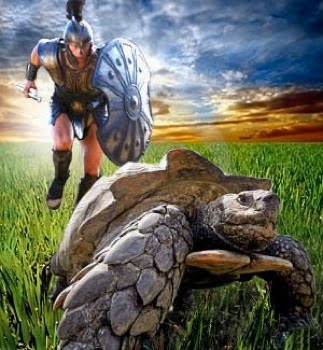
Zeno's arguments about motion, which cause so much disquietude to those who try to solve the problems that they present, are four in number. The first asserts the non-existence of motion on the ground that that which is in locomotion must arrive at the half-way stage before it arrives at the goal. This we have discussed above.
The second is the so-called 'Achilles', and it amounts to this, that in a race the quickest runner can never overtake the slowest, since the pursuer must first reach the point whence the pursued started, so that the slower must always hold a lead. This argument is the same in principle as that which depends on bisection, though it differs from it in that the spaces with which we successively have to deal are not divided into halves. The result of the argument is that the slower is not overtaken: but it proceeds along the same lines as the bisection-argument (for in both a division of the space in a certain way leads to the result that the goal is not reached, though the 'Achilles' goes further in that it affirms that even the quickest runner in legendary tradition must fail in his pursuit of the slowest), so that the solution must be the same. And the axiom that that which holds a lead is never overtaken is false: it is not overtaken, it is true, while it holds a lead: but it is overtaken nevertheless if it is granted that it traverses the finite distance prescribed.
Aristotle, Physics VI:9
The first two paradoxes (the dichotomy and the Achilles) are directed against the opposite conception, that of the infinite divisibility of space and time, and are based upon the impossibility of conceiving intuitively the limit of the sum of an infinite series. The four paradoxes are, of course, easily answered in terms of the concepts of the differential calculus. There is no logical difficulty in the dichotomy or the Achilles, the uneasiness being due merely to failure of hte imagination to realize, in terms of sense impressions, the nature of infinite convergent series which are fundamental in teh precise explanation of, but not involved in our oubscure notion of, continuity.
C. B. Boyer, The History of the Calculus and Its Conceptual Development, p. 24-5
Of course Achilles wins. The distances and the times between each step get shorter.
Let's say Achilles and the tortoise are given a 1 kilometer track that they must race.
The
tortoise is given a 100 meter head start. Achilles travels that same
100 meters in 10 seconds (just under the world record). When he gets
there, the tortoise has travelled a farther 10 meters (we can already
see, the tortoise has a speed of 1 meter/second and Achilles has a speed
of 10 meters/second). No problem, this takes Achilles 1 second to
travel that 10 meters, by which time the tortoise has traveled only 1
farther meter. No problem, this takes Achilles 1/10 second to catch up
(we're now straining human reflex time to even notice these small
numbers). How far would the tortoise travel in that 1/10 of a second?
Less than 1 meter. So what? In the next 9/10 seconds the tortoise will
have travelled 1 meter from where it was 1 second ago while Achilles
will be 9 meters ahead of the
tortoise. Given a 100 meter head start it will take Achilles (assuming
he does not fatigue over the distance) 11.2 seconds to overtake the
tortoise.
Even if Achilles slows down from fatigue, he will be
much farther down the track than the tortoise. So far, in fact, that the
tortoise will have no chance of catching up unless Achilles decides to
stop and wait just to taunt the tortoise (Achilles was a notorious
braggart).
Not much of a paradox, is it?




















No comments:
Post a Comment